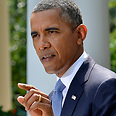
Israelis disappointed by Obama decision
Poll shows most Israelis root for US strike in Syria, some think president's call to wait for Congress' green light shows weakness. 'Obama looks spineless,' says expert
Weekend polls indicate that more than two-thirds of Israelis favored a US strike against Syrian President Bashar Assad’s regime following the verification of chemical weapons attacks on Syrian civilians. Following President Obama’s announcement that he would seek authorization from Congress, many Israelis were dismayed.
“Most Israelis feel very disappointed that the leader of the free world, the American president, is lacking determination and looks spineless,” Efraim Inbar, the director of the BESA Center at Bar Ilan University told The Media Line. “Israel is interested in a strong America. Obama’s action weakens America and makes it the laughing stock of the Middle East.”
Related stories:
- Kerry: US has evidence sarin gas was used in Syria
- More than 110,000 dead in Syria conflict
- US press divided over Obama decision on Syria
On the streets of Jerusalem, many Israelis said they didn’t understand why President Obama made the decision to hold off until he gets a green light from Congress.
“Waiting for a green light from whom?” Gary Heller, an Israeli tour guide asked The Media Line angrily. “The president of the United States of America, the leader of the free world, defender of freedom, democracy, and human rights, granted the unilateral power to strike at America's enemies without Congressional approval under the War Powers Act, blinked. That's right, he blinked, and the forces of evil in the world took note. They certainly took note. Make no mistake about it.”
Video courtesy of jn1.tv
In the US, many in both Capitol Hill and among the public were gratified that the President was not rushing into another military conflict, but seeking backing from the Congress. Although US polls show very mixed feelings about a US strike, Secretary of State John Kerry continued to sound combative and convinced that the Congress would authorize a strike.
“If each member of Congress looks at this case carefully as they will and makes judgments about what happened and then measures it against the stakes for our ally Israel against our interests with respect to Iran, with respect to Hizbullah and North Korea…as the Congress weighs the potential damage to America’s credibility in the world, I think the members of Congress will choose to do the right thing and so does the President.” Kerry told the ABC News program “This Week” on Sunday.
Israeli officials refused to comment, saying, as they have since the civil war in Syria began, that Israel does not want to interfere in the internal affairs of Syria. Yet, Israel will almost certainly be involved if there is an American strike. Israel and Syria share a border and a long-running dispute over the Golan Heights, which Israel acquired in 1967 and later annexed.
Assad has also threatened to strike Israel if the US attacks Syria, a threat echoed by Iran. A poll by the Israel Democracy Institute found that almost half of Israeli Jews believe that would happen, while 42 percent say Assad will not follow through on his threat. The same poll found that if the US leads an attack on Syria, 54 percent believe that the status of the US as a key player in the Middle East will be strengthened.
The Iran question
Israelis also see the situation in Syria as a test case for Iran. Just as in Syria, Washington has laid down certain red lines for Tehran, and has promised Israel that it will not let Iran become a nuclear power. Many Israelis say that if the US is seen as backing down on Syria, it will make it harder to follow through on Iran.
“It seems quite clear that if the president is not able to make a decision on a limited strike as he defined it on Syria, it’s questionable if he’s going to do anything on Iran,” Inbar said.
President Obama’s decision came after Parliament declined to give backing to British involvement in any attack. Richard Dalton, a former British Ambassador to both Libya and Iran, said the US had pushed the UK for a quick decision.
“The hurry for the attack led to a completely inadequate presentation of the issues and the failure of the government to overcome the consequences in the British public mind of the Iraqi debacle,” Dalton told The Media Line. “Now to have Obama deciding after the British vote that he needs to give Congress the same opportunity is immensely galling to those in the UK who wanted to see us play our part in deterring chemical warfare in Syria.”
Dalton said that after the protracted conflicts in Iraq and Afghanistan, the British public is not interested in another conflict in Syria.
Article written by Linda Gradstein.
Reprinted with permission from The Media Line
- Receive Ynetnews updates directly to your desktop










